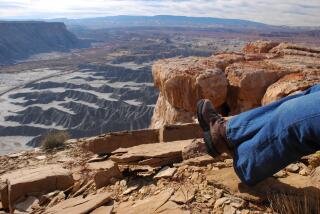Tim DeChristopher’s wild legal ride
- Share via
Tim DeChristopher created quite a circus at an auction of federal oil and gas leases in Utah last December when he bid for and won 14 parcels worth $1.8 million -- and then announced that he had neither the intention nor the money to pay for them. In fact, he was just a college student (an economics major, it turns out) unleashing a bit of havoc to protest drilling and global warming, an environmentalist frustrated by “incrementalism” who was desperately trying to shake things up.
He succeeded. His stunt halted the bidding, grabbed national headlines and renewed debate about civil disobedience and the appropriate limits of protest. Many of the leases, which would have permitted drilling on more than 110,000 pristine acres of public land in Utah, including some of America’s most beautiful and environmentally sensitive red-rock desert, were subsequently canceled. But for DeChristopher, there have been serious consequences. He was charged with making false statements and interfering with an auction (who knew that was a felony?) and faces up to 10 years in prison and fines of $750,000 if he is convicted on both counts.
Hero? Lawbreaker? Stooge? The answer probably lies somewhere in between. It’s hard not to sympathize with DeChristopher’s sense that signing petitions and turning off the lights are an insufficient stand to take against something as enormous and potentially catastrophic as global warming. It’s also hard not to applaud the sheer audacity and comedy of his scam. At the same time, DeChristopher did break the law, and people who break the law in acts of civil disobedience generally have to pay the consequences for their audaciousness -- it’s a part of the tactic. That’s what we said in an editorial last year, expecting the controversy to die down soon.
But it turns out that DeChristopher wasn’t quite done with us. With his trial approaching, he and his lawyers announced that they would mount what’s known as a “defense of necessity” or “choice of evils” defense. Rather than hiding behind technicalities or throwing himself on the mercy of the court, DeChristopher planned to address the issue head on, arguing that global warming poses such an immediate and dire threat that his illegal actions were justified. His lawyers said they hoped to call witnesses such as former Interior Secretary Cecil D. Andrus and NASA scientist James Hansen, who has been leading the fight against greenhouse gas emissions since the 1980s. In short, DeChristopher hoped to turn a relatively straightforward criminal case into a judicial inquest on climate disruption; global warming itself would be on trial.
The tactic is not entirely new. A similar defense was brought in the case of six Greenpeace activists who caused about $50,000 worth of damage to a coal-fired power station called Kingsnorth in Britain in 2007 while occupying a smokestack in an effort to shut down the plant. A jury acquitted all six.
But last week, DeChristopher’s attorneys were informed by U.S. District Judge Dee Benson that they had not met the threshold requirements for a choice-of-evils defense. Benson, who had already said he was “reluctant to open my courtroom to a lengthy hearing on global warming,” ruled that the supposed harm that would have resulted from the sales of the leases was not imminent in the sense that, say, a fire causes imminent danger. What’s more, DeChristopher had “reasonable, legal” ways to stop the auction other than breaking the law -- such as filing a lawsuit or demonstrating with the other activists outside the building. Nor, the judge said, could DeChristopher have reasonably anticipated that his actions would stop the sales.
So much for that bit of guerrilla theater; it’s back to square one for DeChristopher and his lawyers. In our view, the judge was probably right, but it’s a shame. A global warming trial would have been more sensational, more educational and, frankly, more fun. As for DeChristopher, we still believe he must pay a price for flouting the law, but it would be disappointing if he had to spend too much time atoning for what was, in the end, a creative act of civil disobedience.
More to Read
Sign up for Essential California
The most important California stories and recommendations in your inbox every morning.
You may occasionally receive promotional content from the Los Angeles Times.













